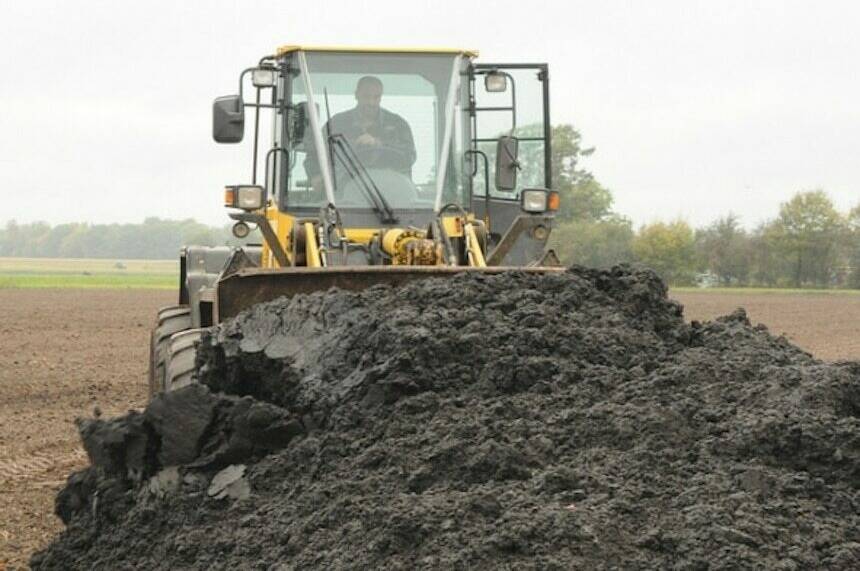THURSTON, Aug. 26, 2023 — Casella Waste Systems Inc. is seeking to rally support from two state agencies in its bid to sidetrack the Town of Thurston’s proposed ban on the spreading of sewage sludge on local farm fields.

The state Department of Environmental Conservation and the state Department of Agriculture and Markets both have an interest in opposing the ban due to its “adverse environmental impacts,” the company argued in an Aug. 23 letter to Ag and Markets Commissioner Richard A. Ball.
“The proposed ban surely will result in, among other things, the increased use of chemical fertilizers (with resulting environmental impacts) and an increased burden on landfills,” wrote Mary Rayeski, manager of Casella’s Bonny Hill Organics facility in Thurston.

Rayeski warned that the enactment of the ban would “effectively close this facility” and “set a precedent,” allowing local officials “to push their agenda throughout the state.”
She urged Ball “to intervene prior to the special meeting Aug. 28” that the Town of Thurston has called to consider the proposed sludge ban.
Ball did not respond to phone and email requests for comment Friday.
Casella acquired the Bonny Hill facility last July from Leo Dickson & Sons. It includes more than 2,700 acres spread across the towns of Thurston, Cameron and Bath. The DEC is reviewing applications to transfer the Dickson sludge spreading permit to Casella and to add a major new source of sludge from Long Island.
Three senior DEC officials appeared at a public hearing in Thurston Aug. 10. One one of them, Sally Rowland, spoke at length about the agricultural benefits of spreading sewage sludge to a highly skeptical local audience.

Many residents who live near the Bonny Hill facility have said their well water is no longer drinkable, and they blame decades of sewage sludge spreading by the Dickson operation.
Thurston Town Supervisor Michael Volino said he and other town board members are seeking the ban in response to that local health crisis.
Meanwhile, Rayeski’s letter suggests that Casella believes the proposed ban may be vulnerable to legal challenges under the State Environmental Quality Review Act (SEQRA).

Seneca Meadows Inc., the state’s largest landfill, has shown that strategy can work.
SMI obtained a state court ruling in June invalidating a Seneca Falls town law that required the landfill to close in 2025 on the grounds that the town violated SEQRA rules in the process of enacting the law.
Seneca County Supreme Court Justice Daniel Doyle said the town had failed to take the SEQRA-required “hard look” at the potential environmental harms of closing the landfill in 2025.
Doyle ruled that the Seneca Falls board should have analyzed where it would send county waste after SMI closed and should have assessed the gas emissions of the vehicles used in the new waste hauling.
SEQRA was enacted in 1975 to provide New York communities a public process to challenge proposed development projects or other actions that might cause them environmental harm. But the Seneca Meadows case demonstrates that a polluter can use the same law to overturn an action taken by the victims of pollution to try to minimize their distress.

In her letter to Commissioner Ball, Rayeski argued that both the Department of Agriculture and the DEC have cause to intervene in the Town of Thurston’s SEQRA review, which is required before the law can be enacted.
The Ag Department, she wrote, is responsible for protecting “sound agricultural practices (such as land application of biosolids)” protected under the state’s Right to Farm law. The DEC, Rayeski said, should step in because the ban would invalidate the Part 360 land application permit it issued to Leo Dickson & Sons.

“Troublingly, the (town’s) SEQRA documents … fail to acknowledge any adverse environmental impacts from the ban of organic fertilizer,” Rayeski wrote in her letter to Ball. “These issues need to be identified and vetted through the SEQRA process, with proper notice to and involvement of … interested state agencies.”
Volino said today that he and the town’s attorneys do not agree that either the DEC or the Department of Agriculture need to be involved in the SEQR review of the proposed sludge ban.
Volino, who was copied on Rayeski’s letter to Ball, responded with his own letter to Ball two days later. He wrote that the ban is not intended to conflict with the Right to Farm law.
“As we understand it, the Right to Farm law does not apply in situations involving public health and safety as sewage sludge spreading does,” Volino wrote.
He noted in his letter that recent tests of private drinking water wells near the sludge spreading on Bonny Hill showed toxic PFAS ‘forever chemicals’ totaled up to 18.1 parts per trillion.
The state limits for two different PFAS chemicals in public drinking water is 10 parts per trillion.


Also copied on Rayeski’s letter to Ball were Tom West, Casella’s lead attorney in Albany; Dan Plummer, a Casella lobbyist in Albany; and David Vitale, acting Deputy Commissioner of the DEC, who attended the Aug. 16 public hearing in Thurston but did not speak.

In his letter, Volino copied state Sen. Tom O’Mara, who had sent an aide to the Aug. 10 hearing. The O’Mara aide did not comment at that hearing.
O’Mara on Friday declined a request by WaterFront to state his position on the proposed sludge spreading ban.
“(Sen.) Tom (O’Mara) asked me to touch base to let you know that he will be unable to provide a response by your deadline since he is traveling on vacation through Labor Day,” James J. Meddleton said in an email to WaterFront Friday.
O’Mara’s Senate district includes both Thurston and Seneca Falls, home of Seneca Meadows.
O’Mara is a partner in the law firm Barclay Damon, which done legal work for Casella.

